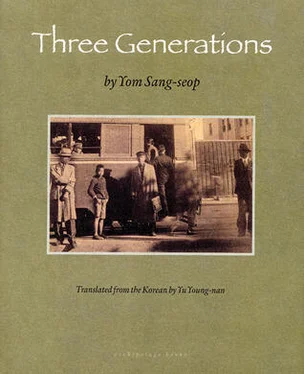The policeman quickly grabbed her by the collar.
Gyeong-ae stumbled and almost fell to the floor. She managed to regain her balance but then found herself in the policeman’s firm grip. Stifled giggles came from the crowd of spectators, who had gathered to witness the excitement.
The policeman who was to take them away quickly attached a sword to his belt, letting it clang against him, and took his hat from the wall. Gyeong-ae brayed in protest, and Byeong-hwa stamped his feet and railed, but they were both drowned out by the policeman’s sharp voice. Meanwhile, Sang-hun stood pleading with another policeman, half in Korean, half in Japanese. Provoked by Gyeong-ae, the policemen were not inclined to change their minds. Still, they couldn’t simply tie these three together with a rope to lead them away, and they didn’t seem eager to venture out on a snow-covered road with three uncooperative people in tow. Byeong-hwa was slapped on the face a couple of times, but he continued to put up a struggle. From the outset, the police had talked about taking them down to headquarters only as a threat. After a policeman kicked Byeong-hwa in the shins, and the young man fell in a heap on the floor, things finally quieted down.
Sang-hun took this opportunity to plead with them again. Only then did the policemen tell him to write down his name, address, and occupation. When Sang-hun wrote down “teacher” as his occupation, they demanded to know which school he taught at and gave him a long-winded sermon.
“Isn’t that a missionary school? As a teacher and a Christian you should know better than to go out drinking with young people and making trouble for us. You should be ashamed of yourself!” They scolded him as they would a dog, but Sang-hun nodded his head in agreement.
Sang-hun felt he couldn’t leave by himself, but he knew he would have no influence on the release of the others. The policeman took Byeong-hwa into a back room, perhaps a detention room or a toilet.
As for Gyeong-ae, they escorted her to their tatami-floored night-duty room. “You stay here. If we put you two together, you’d probably start kissing him again!” Actually, they treated Gyeong-ae quite well. While it was ridiculous for them to put her in the very room where they slept, she figured it was better than standing out in the cold in full view of the spectators.
Sang-hun reluctantly headed back to Bacchus. With nothing left to watch, the spectators scattered.
“Teacher!” someone called out to Sang-hun as he walked away. Turning his head, he saw a young man clad in a Western suit and a hat. He didn’t recognize the man because the lower half of his face was wrapped in a scarf. Sang-hun instantly broke out in a cold sweat.
“Where are you headed?” the young man asked without tipping his hat, but even when he pulled off his scarf, Sang-hun didn’t recognize him. The young man smiled mischievously. He told Sang-hun his name and that he had graduated with Deok-gi.
Sang-hun acknowledged the young man with a grunt. The young man’s breath smelled of alcohol.
“We went to school with that girl at the police station. What happened?”
“Well, I was just trying to break up a fight between a few young people who’d had too much to drink. ” mumbled Sang-hun, trying to make his escape. But the young man hurried after him wanting to continue the conversation.
“You don’t know me very well, Teacher, but I’ve never forgotten what you did for me. Please don’t dismiss my sincerity.”
Such banter from the mouth of drunk sounded like mockery. Sang-hun suppressed his anger and managed to send him away, only to run into the proprietor of Bacchus who was on her way to the station. Sang-hun thought this was a happy turn of events, and the two went to the station together, where they pleaded for almost an hour before managing to get the two detainees released.
The policemen had never forgotten that the proprietor hadn’t treated them to free drinks when she first opened up the bar. They also resented that, unlike other café girls, Gyeong-ae hadn’t fawned over them when they once visited the bar for an inspection.
The following day Sang-hun didn’t have the energy to get up. He ended up sleeping in the same room as the mahjong players, because they had waited up for him until he returned at three in the morning. They woke late, like professional gamblers, and asked him where he had been the night before, but he gave no reply. The more he thought about it, the more his face burned in embarrassment. Nothing could have been more humiliating. Never mind that Gyeong-ae had taunted him about being a pathetic sight and that he had been chastised at the police station. The memory of it all — how Gyeong-ae had kissed Byeong-hwa, how he had run into a former student — enraged and worried him. It was all Byeong-hwa’s fault, but he couldn’t just leave things as they stood. Today was Saturday, so he thought he might meet Gyeong-ae on his way home from church. But there still remained the matter of the young man he’d run into. He was probably not a churchgoer, judging from how he’d been out on the town getting drunk, but Sang-hun still panicked that rumors might spread among his acquaintances and reach the ears of the congregation.

The old man’s cold had worsened from the night before. When Sang-hun arrived at his father’s house after a servant delivered a message, he found the doctor sitting at his father’s bedside. The doctor said that his father’s condition could easily develop into pneumonia and advised them to pay close attention to him for the next few days. Then he promptly took his leave.
The way Sang-hun saw it, his father’s cold had begun the same day he had had his fall. Sang-hun thought a Chinese brew might make him feel better, but knowing his father wouldn’t listen to the idea if he were to mention it, he told Secretary Ji to suggest it. His father refused it all the same. Perhaps his father had suddenly become enlightened, for he insisted that Western medicine was not only as good as Chinese medicine for the treatment of a cold, but better for the lungs.
Secretary Ji sat with the old man all day in order to change the hot packs on his back and chest. The one on his chest was added that day to ward off pneumonia.
Except for his limbs and head, the old man lay shrouded in warm, wet cotton, which made him feel as though he were lying in a puddle of his own urine. He had never experienced this sensation before, but he liked how it felt on his bony body. If he had been able to get up and move around a bit, he would have certainly gone to the main room to lie down comfortably under the Suwon woman’s care. But because of his bad back he had been told not to move a muscle, and truth be told, he wouldn’t have been able to even if he had tried. The old man thought that it would be all right for him to take the Chinese medicine if only he were able to lie down in the main room. He refused to take it not because he really preferred the Western sort, but because the Western medicine had a cork that could be sealed with paper. The bottle could be placed beside his pillow, where he could pour out a dose of it himself or watch someone else pour it. In the unlikely event that anyone had tampered with the bottle, he could immediately dispel his doubts by asking the doctor to examine what was left in the bottle. The doctor would be obliged to take the job of administering seriously.
It would be impossible to supervise all the steps in the preparation of Chinese medicine, however, from the initial brewing to its final delivery to the outer quarters, and the old man would not have peace of mind, knowing that it had passed through several pairs of hands before reaching him. If he had the medicine brewed in the outer quarters in front of him, everyone would consider it most bizarre, and his secret paranoia of being poisoned would be exposed. Furthermore, Chinese medicine, unlike Western elixirs, is not taken in several small doses. A Chinese brew had to be swallowed all at once, and that was that. If the brewing pot was washed out and the dregs disposed of, there wouldn’t be a trace of evidence left to suggest foul play. The old man’s hypersensitivity made him increasingly suspicious as the days went by. He grew even more paranoid after the Suwon woman whispered to him those disparaging remarks about his daughter-in-law. It was perfectly understandable for someone already frightened of dying to become even more afraid after being told that his children wanted him dead. These groundless suspicions had found a perfect breeding ground in the mind of this bedridden man, who normally didn’t sleep much during the long nights. To make matters worse, he had plenty of assets that he knew his children coveted. So when he thought about it, he felt he could trust only the Suwon woman, the woman with whom he shared a bedroom. The others, he figured — the whole selfish lot of them — went around with greed-filled eyes and were only interested in wringing as much money out of him as they possibly could.
Читать дальше













